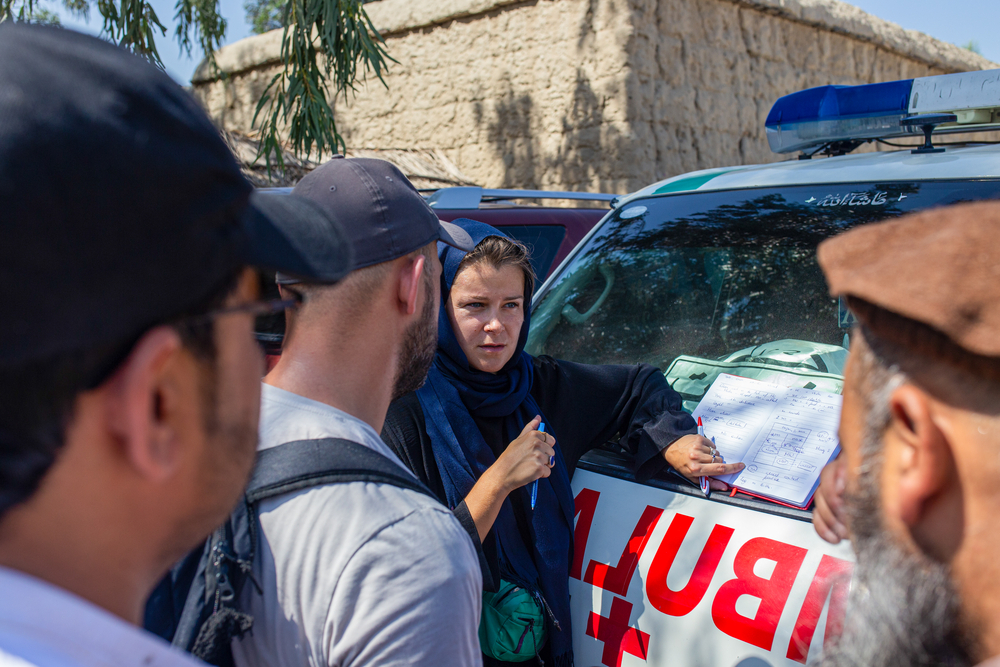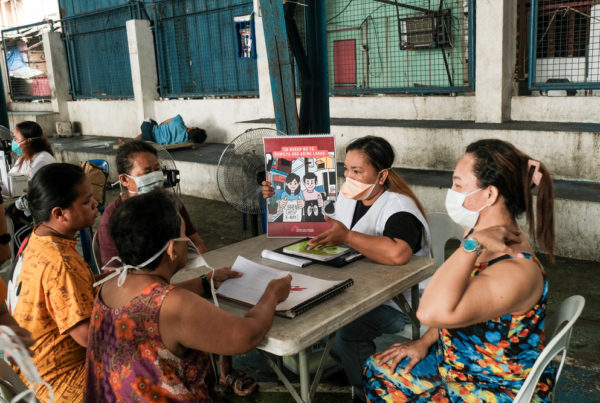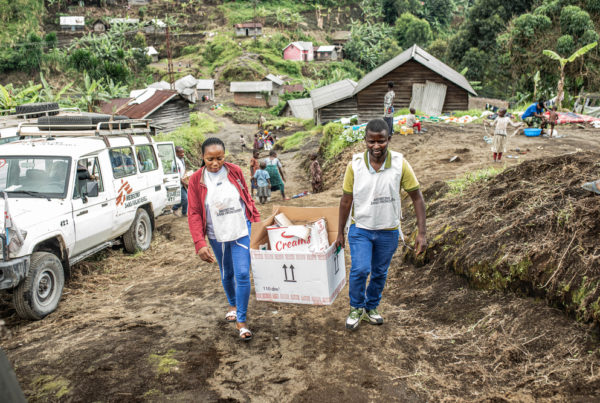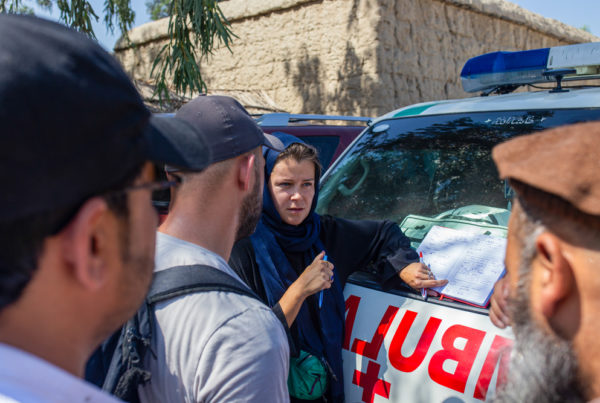
Imagine a stranger asks you for a favour that could damage your reputation, undermine your authority, and hurt your chances of promotion.
Would you say yes?
When someone asks something of us – especially something that puts our social status, earning potential, or values at risk – we find it hard to agree. We won’t expose ourselves to these risks unless we have a very good reason or get something valuable in return.
Humanitarian negotiation works exactly like this, except we are often the ones asking a stranger for a big favour.
Your counterpart doesn’t know you, yet you might ask them to, in their eyes, risk their sovereignty, status, or jurisdiction. Before they’ll let your team into a conflict zone, accept your vaccination protocols, or approve the opening of a new clinic, they need to know who they’re talking to and whether they can trust you.
In volatile, high-stakes environments where suspicion and risk-aversion dominate, building trust is a fundamental skill.
Everyone depends on strangers to do their job
Whether we like it or not, we depend on others to implement our humanitarian operations.
In most contexts, our teams can’t work unless they receive approval from authorities, gain access to armed groups’ territories, or earn acceptance from local communities.
This dependence can feel uncomfortable, even vulnerable. We want to reach affected communities quickly.
But our counterparts might not share this urgency. They might not know why we are there and can even feel annoyed by our requests.
In high-stress, high-threat and polarised environments, it can be difficult for others to understand that you are there to help, irrespective of who needs that help.
Even if our counterpart shares our belief that assisting and protecting affected communities is the highest priority, they are looking out for their own interests.
If they let us through, they might get in trouble with their superiors or appear weak to their constituents.
Building relationships with the people in front of us helps overcome this resistance.
We can build rapport by showing genuine interest in our counterpart’s fears and concerns. When we demonstrate that we understand the risks they are taking, we’re more likely to achieve positive negotiation outcomes in the short term and in the future.
Establishing connections before differences arise also gives you the opportunity to show you’re working in good faith. Any disagreement isn’t because you want to deceive the other person – misunderstandings happen because we’re human.
What relationship building actually looks like (hint: it's not networking)
Relationship building in humanitarian negotiations is any informal interaction with counterparts – basically, talking about everything except what you’re negotiating about.
Experienced negotiators follow the two-meeting rule: They avoid making any demands in their first two meetings and focus entirely on getting to know the person. What interests them? What do they do in their free time? Do they have a family? Are they religious?
This personal investment pays off because effective negotiations require mutual knowledge that only comes from asking questions and sharing information. Understanding your counterpart’s values, beliefs, and motivators – what drives them – gives you the foundation for successful agreements.

Abdalmajid Alshaer, humanitarian professional
“[For] the first two meetings, if it isn’t really life-saving and urgent, I avoid any demands. Zero demands. […] I am going to engage and build a relationship at the beginning. Chit chat, drink tea, coffee, and all of that. This will break the ice.”
The key distinction: engagement versus negotiation. As one expert explains:

Nadja Leuenberger, humanitarian professional
“Within [my organisation], we distinguish between engagement, which […] is a synonym for relationship building, and the negotiation phase. […] The engagement phase is really any kind of interaction […] with all key actors on the ground, whether they have a lot of influence or aren’t that powerful.”
Why we say yes to the people we like
Research proves relationships matter: Negotiators who had brief, getting-to-know-you phone conversations felt more cooperative toward their counterparts than those who skipped the small talk.
Human behaviour is reciprocal. If others cooperate and treat us respectfully, we respond in kind. If they appear guarded and competitive, we behave similarly. These patterns escalate into either vicious cycles (conflict and suspicion) or virtuous cycles (cooperation and goodwill).
The solution is simple: Establish personal connections through informal conversations before beginning negotiations. Even a few minutes of small talk creates significant psychological shifts.

Kirk Kinnell, professional negotiator, Negotiated Resolutions
“When you’re starting to build a relationship, it’s important to find as many connections with your counterpart as you can. Once rapport is established, humanitarians can move on to building trust.”
4 ways strong relationships transform your operations
1. Remove pressure and create human connections
In high-stakes situations, small talk removes pressure on both parties, allowing you to connect as human beings rather than adversaries.
2. Gather crucial insights
Building rapport helps you understand what makes your counterpart tick. This mutual knowledge – exploring their interests, motives, and personality – helps you find common ground and identify acceptable alternatives.
3. Make operations more efficient
Establishing contacts before crises hit ensures quick access, staff safety, protection, detention issue resolution, and operational continuity. You’re not wasting time building connections during emergencies – you’ve already done it.
4. Enable better conflict management
Established relationships provide stronger boundary setting and conflict resolution because counterparts understand you’re not acting in bad faith. They know your values and recognise your integrity, leading to agreements that work for everyone.
Example
Before Hay’at Tahrir al-Sham (HTS), an armed group that was part of the opposition, became part of the Syrian government in early 2025, it lacked the resources, military strength, and financial capabilities it possesses today. Now that HTS has begun to govern the country, its scope of operations has expanded significantly. However, despite this regime change, a humanitarian organisation that had established a relationship with HTS five years prior to the group’s rise to power has continued its operations without interruption.
When getting too close backfires (and how to avoid it)
Overfamiliarity is the most considerable risk. When personal and professional boundaries blur, you might make wrong assumptions, leading to miscommunications and incorrect expectations.
Close bonds create conflicts of interest where your personal concern for someone clashes with official responsibilities. This limits your ability to set clear boundaries because you don’t want to damage personal relationships.
Overdependence on one contact exposes you to being cut off if that person becomes unavailable, changes position, or if there’s staff turnover in your organisation.
These risks weaken objectivity and limit operational reach.
How to avoid these pitfalls:
- Maintain professionalism, always
- Set clear objectives and expectations
- Document agreements
- Diversify your network
- Seek legal advice when needed

Zelal Zaqr, humanitarian professional
“Set clear expectations in your relationship to prevent any misunderstanding, and to ensure that both parties are aligned with the terms of engagement. Document the agreements between you and the other party. [And] if you are stuck […], seek legal advice.”
5 relationship killers that destroy negotiations before they start
1. Avoiding small talk
We’ve all been guilty of rushing into “business talk.” Our sense of urgency and wish to bring relief as quickly as possible can make us forget that small talk isn’t so small after all.
Taking time to introduce ourselves, present our organisation, and listen carefully to our counterparts’ concerns helps improve our negotiation outcomes.

Nadja Leuenberger, humanitarian professional
“Sometimes, there’s high pressure that we need an agreement. We need solutions, but we need to build this relationship if it’s not there yet. […] We cannot […], with someone with whom we have no relationship, […] march in and ask for things. That’s not realistic.”
2. Partisan perceptions
As humans, we tend to see our own side as more intelligent, skilled, reasonable, and moral than the other side. This is called “partisan perceptions.”
Being aware of this unconscious bias can help you avoid perceiving your counterpart negatively.
3. Not building a diverse team
If your team lacks a mix of national and international staff, you’ll miss out on improved cultural sensitivity, adaptability, and clearer communication – all crucial elements for positive relationship building.
A diverse team brings diverse perspectives and negotiation strategies. For instance, national staff can explain cultural nuances and have easier access, while international staff can shield their local colleagues from pressure by authorities.
4. Failing to maintain the relationship
Many of us have been guilty of reaching an agreement, getting what we wanted, and never contacting our counterpart again.
Engage with your counterparts from time to time. Simple gestures, such as sending holiday messages or asking how they are, can go a long way.
5. Reactive relationship building
A very common yet big mistake is building relationships when it’s too late – like when a crisis hits, your counterpart gains power (think an armed group that becomes the official authority), or when you need to rebuild trust after a breach.

Nadja Leuenberger, humanitarian professional
“We should expect that people or groups become more powerful, or lose power, in a very short time. […] The reactive approach to relationship building we often take is very harmful for our work.”
Your step-by-step playbook for building trust with anyone
1. Seek introductions from trusted intermediaries
When meeting for the first time, you might ask to be introduced by someone your counterpart already trusts.
Like in other professional situations, an introduction by a trusted intermediary who can vouch for you can get you that first meeting and open the door to establish initial engagement.
2. Plan an informal meeting first
When you meet a counterpart for the first time, focus on informal, light conversation.
Small talk or chit chat is what this first meeting should be about. For instance, you can talk about the weather, the context where you’re having the conversation, or the way to the meeting (if you had long travel).
3. Be consistent
Showing you’re reliable is a fundamental relationship-building block. How do you do this?
By showing up at the agreed place and time, following up on your words, and being upfront about what you can and can’t agree to.
4. Select the right person in your team for the first contact
First impressions are hard to change. Make sure you send the right person to the first informal meeting.
Often, security personnel conduct the first conversation and might focus too much on getting access. If you ensure that those engaging with your counterpart understand programmatic goals and can explain the rationale behind getting access and keeping your team safe, you’ll more likely have a fruitful conversation.
5. Engage with everyone, even if they seem small
Build relationships with as many actors as you can, and don’t neglect them just because they seem small at the time.
Working in conflict zones means things change constantly, and the actor who didn’t have any influence at the beginning might prove to be the key that unlocks your negotiation a few years down the line.
3 insider secrets that separate pros from amateurs
1. Check in with your counterpart
Sending a quick message for a holiday or simply asking how they are is an easy way to stay in touch and maintain relationships over the long term.
2. Build a broad network
Not relying on a single contact to help you solve issues reduces vulnerability and increases your chances of getting timely access.
Diversifying your contacts is especially important in the humanitarian sector because of high turnover, not only with your peers but also with counterparts.
3. Be comfortable operating in grey zones
Although we would ideally document any agreement we reach with counterparts, sometimes forcing a memorandum of understanding or having a written record of what was discussed might not be the best solution.
Some counterparts might be reluctant to sign documents and prefer relying on oral agreements. Some negotiators mentioned they use instant messaging apps, like WhatsApp or Signal, as their documentation method.
Whether we like it or not, we need to feel comfortable operating in grey zones.
Real-world proof: How relationships saved these missions
Building rapport remotely
As humans, most of our communication happens non-verbally. We might not be aware of it, but our brain constantly scans our conversation partner’s tone, speech volume, and body language to determine if our message is getting across.
Because we can’t rely on this when we speak to someone remotely, we need to be extra aware of how our tone comes across. Especially in writing, if we’re too dry or direct, we might appear unfriendly.
However, remote communication also has many positive aspects. For instance, it can be more flexible when scheduling meetings and hosting other people on the same call.
Regime or political change
Due to the nature of humanitarian contexts, regime or political changes are bound to happen.
Part of the job as a humanitarian is anticipating instability, sectarian violence, and new protection challenges, which is why you should build relationships proactively.
If you haven’t been able to establish a connection, building relationships with new authorities is vital, especially after political change.
Example
Syria has had a new government since the beginning of 2025. However, the new authorities lack experience in national-level operations. When discussing with the new government, a humanitarian organisation with experience working across Syria explained that managing assistance on a national scale differs significantly from addressing needs in limited, localised areas.
For example, providing humanitarian aid in coastal regions differs from operating in the country’s central areas. The population demographics vary, and the logistics of transporting goods change; items sent to coastal areas are often delivered by sea through ports, rather than by road. This also entails a different customs clearance process.
By demonstrating professionalism in these matters, the humanitarian organisation fostered trust with the new government, thereby assisting it in achieving its goal of delivering humanitarian aid to affected communities.

Nadja Leuenberger, humanitarian professional
“Relationship building doesn’t become more important when there is a regime change, but the problems, if we don’t have these relationships, become more obvious.”
When trust is broken
Mistakes are inevitable. Trust can be broken, and you might need to rebuild a relationship.
If that’s the case, it’s best to absorb the anger, be a good listener, and let your conversation partner calm down. Avoid blaming colleagues.
Once the tension has settled, take the opportunity to highlight the positive aspects of your relationship, mention trusted names, and gradually rebuild trust.
If appropriate, apologise and ask how to fix the situation, while staying cautious of unreasonable demands.
Your 5-point checklist for negotiation success
When you’re meeting a counterpart for the first time and requesting something from them, you’re asking them to take a big risk.
They don’t know you, they don’t know if they can trust you, and they’re putting their reputation on the line.
Taking time to build rapport, show your genuine interest in the other person, and demonstrate that you understand your demand isn’t without risks for them shouldn’t be neglected.
- Be proactive in your relationship building
- Don’t skip small talk
- Engage with every actor, big or small
- Maintain the relationship
- Build a broad network
Building sustainable relationships will make your operations more efficient by building trust, making it easier to gather information, and solving conflicts more smoothly.
Good luck!



